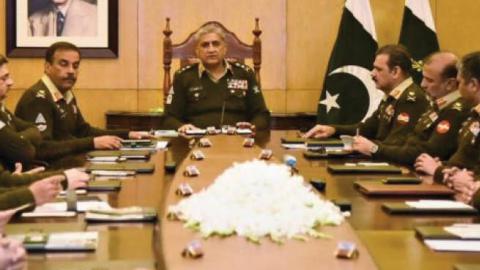Pakistan’s opposition parties have, once again, formed a broad alliance, even as special assistant to Prime Minister Imran Khan, Lt Gen (retd) Asim Saleem Bajwa, resigned from his post Monday.
Such alliances have been created several times since politicians opposing Pakistan’s first military ruler, Field Marshal Ayub Khan, allied against him in the 1960s. But, unlike in the past, this time the politicians have not been content with targeting just the president or prime minister of the day. They are questioning the very premise of the military’s role in Pakistan’s politics.
The army under General Qamar Javed Bajwa thought that wielding power without taking the driver’s seat would insulate it from becoming the target of criticism. But Prime Minister Imran Khan’s civilian government has not been able to protect the military from political attacks while executing General Bajwa’s policies. The weak civilian façade has created an opening for civilian politicians to demand ‘undiluted democracy.’
The opposition leaders all have their flaws, but each of them also has a popular support base. Supporters of politicians expect them to be flawed and support them with those shortcomings. Support for the army, on the other hand, rests on the assumption that it is an institution above politics, trained and willing to defend the country.
Pakistan’s army has been involved in politics since Ayub Khan took over as army chief in 1951. Still, its officers’ oath insists that they would not concern themselves with politics and the army tries hard to maintain the appearance that it is a national institution, not a political actor.
But recently, one of the many retired generals who appear regularly on Pakistani television channels described the army as “Pakistan’s largest political party.” As opposition politicians start criticising the army, treating it as a rival party, General Bajwa might be forced to revisit his strategy of letting the people see Imran Khan’s government as the army’s own, while describing opponents and critics as enemies of Pakistan.
A mythical entity
As I had noted in The Indian Express once, Major General (retd) Sher Ali Khan Pataudi had in 1969 advised Pakistan’s second military ruler, General Yahya Khan, “that the reason the military was able to snatch the initiative from politicians after the fall of Field Marshal Ayub Khan was not because of its firepower but because of its charisma.”
Pakistan Army’s charisma was “the precious political resource that once lost would not be easily retrieved.” It was better for the army to remain, for the people, “a mythical entity, a magical force, that would succour them in times of need when all else failed.”
According to Sher Ali, “In the minds of the people, unlike the bureaucracy and the politicians with whom they had daily contact and whom they knew to be corrupt and oppressive, the army was the final guarantor of Pakistan and its well-being.” The army needed to exercise power from behind the scenes to keep things that way. It could not shoot its way through its own people.
Each period of direct rule by a military commander — Ayub Khan 1958-69, Yahya Khan 1969-71, Mohammed Zia-ul-Haq 1977-1988, and Pervez Musharraf 1999-2007 — has ended with the return to power of politicians the army so desperately wants to bypass. The reason is the military’s desire to avoid exposing itself to the people, to the point of losing its charisma.
But over time, the Pakistan Army has become too intertwined in politics and the media, diluting the charisma that depended on the army being a mythical entity.
This time, the army commander is not even directly in power and already the role of the army is becoming politically controversial. The army will, once again, have to think of ways to rule without being seen to be ruling.
Bajwa’s reluctance
General Bajwa has already held out an olive branch to critics of the army’s political role by saying that positive criticism must not be confused with hybrid war against Pakistan.
“Most voices that might seem loud to you, come from a place of love, patriotism and trust and therefore must be heeded,” he said while speaking at the passing-out parade of cadets at the Pakistan Military Academy.
Which brings us to the reason why Pakistan’s generals have repeatedly failed at politics.
General Muhammad Musa, Commander-in-Chief of the Pakistan Army (1958-1966) explained that politics baffled him because he was trained to “locate the enemy and liquidate the enemy.” He was trained to obey his superiors and command his subordinates, but did not know how to deal with “my own people” whose beliefs and convictions made them defiant.
Politics is about choosing between alternative solutions, ideas, and policy options. It requires compromise and adjustments, and it involves persuasion, not commanding, and getting obedience.
Even if the opposition parties fail to immobilise the Imran Khan government through large street protests, Bajwa’s political role will force him to engage with an opposition he despises. But it may still not lead to the admission by the entire institution that life in uniform does not prepare a general for the rough and tumble of the political world.
Ironically, the reaction of most Pakistani soldiers to this article will be to dismiss it as an exiled Pakistani writing in an India-based news outlet, without thinking what forces people into exile and why so many of us are barred from writing in Pakistan’s own media.
Read in The Print















